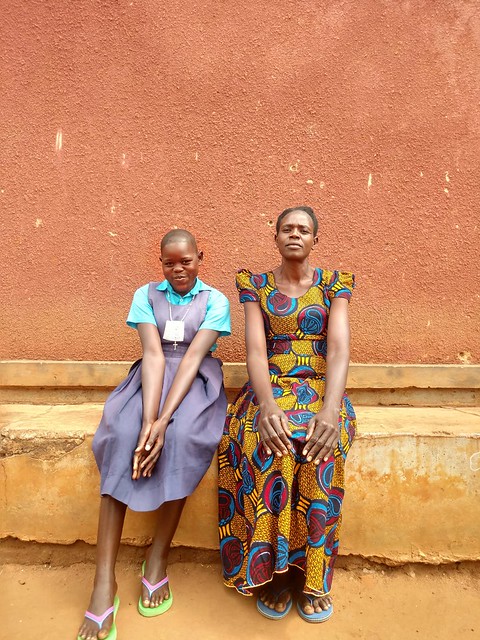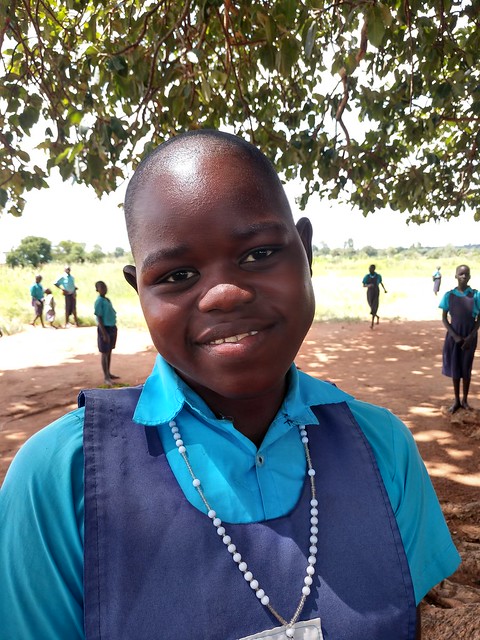“Why a latrine?” It’s a simple question asked by a friend who shall remain nameless. “Couldn’t you dig a well or something? You know, something urgently needed?” I laughed it off. Obviously the point is valid: People – Water = Dead, however I want to use this blog post to explain how a latrine can alter a child’s life entirely.
Monica Ajok speaks in a very soft voice; so soft you have to lean in close to hear her speak, but it’s worth the effort to listen. She has a story to tell. I asked Monica what her favorite subject was in school. It’s a great icebreaker that adults have used on children since the dawn of public education. Most kids say recess or art. But Monica is not most kids and would not be contained by the rigidness of my question. She lists off English, Math, Science and Social Studies as her favorite subjects. How dare I assume she had only one! Monica aspires to be a nurse, to help sick people feel better. I told her that requires a lot of school, but that didn’t faze her. Here is a young girl who knows what she wants and is willing to work for it. There is something more to Monica than her love of studying and aspiration to heal people, she is disabled. I hadn’t even noticed her leg until her mother told me.
“Monica has a lot of challenges. She cannot do a lot of things that other children can do. When she gets home from school, she cannot fetch water. She cannot clean. She has difficulty moving; sometimes she comes home complaining that her leg is [burning].” But Monica’s mother was quick to counter these challenges with a resounding, “But she is just as smart as other children!”
Why a latrine? Before Gulu Disabled Persons Union (GDPU) constructed a latrine at Monica’s school, she had a daily choice between two terrible options. “Coming to school is easy, but I never went to the bathroom. I would either [hold it in] or walk home to use my own toilet.” A school day in Uganda is eight hours long just to put the first choice into perspective. Like most students in northern Uganda, Monica’s house is not exactly close to the school. “It takes me an hour to get home from school.” Just to be clear, a girl with a bad leg walked an hour to her house just to use the bathroom. That means it was another hour before she returned to class. I’ll let that sink in a bit before I tell you the good news…don’t worry, there is good news. Because of the latrine build by GDPU in 2017, Monica can now stay at school without worrying about stomach pains or a two hour hike to the bathroom. “Now my school has a clean toilet [with handrails]… there is soap and water to wash my hands so it’s easier for me to study. “
So why a latrine? It may not be glamorous, but if it empowers more girls like Monica to reach their dreams then I think the question should be; why not a latrine?
Find more pictures from my time in Uganda right here!
Posted By Chris Markomanolakis (Uganda)
Posted Jul 2nd, 2018




6 Comments
Corinne Cummings
July 3, 2018
Hey Chris. I happy this finally uploaded for you. Once again, your blog post thoughtfully tells a compelling story that makes the reader feel as if they are there with you. You have marvelous story-telling skills. Keep it coming! Monica sounds like a special young lady–thank you for sharing a moment of her life. It’s interesting how those living in more developed counties take privilege for granted, such as something as basic as a latrine. I love that Monica enjoys an array of school subjects, I sincerely hope she gets the opportunity to become a doctor. With the kind of willpower that she possesses, there is no doubt in my mind she will become a doctor down the line. Thank you for the excellent pictures, continue capturing those precious moments. I look forward to reading your next blog post, Chris.
Best wishes, Corinne
Samantha Givens
July 3, 2018
Chris, this was a thoughtful and inspiring story. Thank you for sharing this beautiful remark of a young woman with dreams and aspirations, while facing challenges. This is a reminder to us why the “not-so-glamorous’ jobs as you mentioned, are incredibly important. Please keep us updated on Monica, she sounds like a beautiful human being!
Ali West
July 3, 2018
This post really helps emphasize the importance of this project and how something as simple as a toilet can great such a large and direct impact for students like Monica. Thank you for sharing and keep up the great work!
Princia Vas
July 3, 2018
This post genuinely made me happy and Monica’s story is a great example of determination and willpower despite such harsh circumstances. Thank you for sharing her story with us. More power to you, Chris!
Donna J Olson
July 9, 2018
Chris,
What a wonderfully insightful post! It really highlighted the importance of proper facilities for education, especially for those with disabilities. Thank you for sharing Monica’s story and determination!
Karen
July 11, 2018
What a beautiful way to explain the importance and impact of this project, Chris! Reading Monica’s story reminds me how important it is to focus on the individual and the local perspective when doing development work. Thanks for sharing!